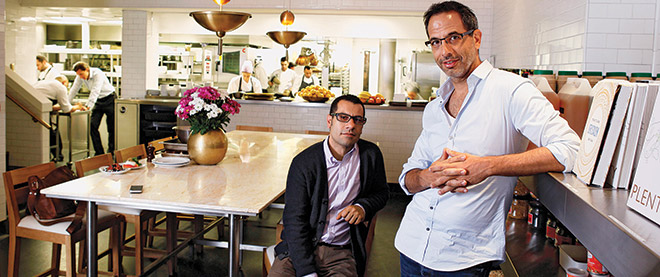How people want to eat now
Ottolenghi and Tamimi unite home cooks in the use of lemon, garlic, hazelnuts, chilies and tahini
David Sandison / Eyevine / Redux
Share

Recently my colleague Paul Wells tweeted that he was cooking for the first time from the cookbook Jerusalem, by Yotam Ottolenghi and Sami Tamimi. He wanted suggestions. I looked at the 140-character limit with frustration—and typed “roasted cauli-hazelnut salad / lamb-stuffed eggplant / salmon in that red sauce / any page at random.” Before long his feed was ablaze with responses from other Jerusalem zealots. Paul made “turkey & zucchini burgers with green onion & cumin” and the “Sabih” chopped salad. Now he’s hooked, he says: “I live in the cookbook when I have serious cooking time available.”
He has joined an army united in its use of lemon, garlic, hazelnuts, chilies and tahini. London-based Ottolenghi and Tamimi, known for their vibrant Middle-Eastern flavours, are to 21st-century home cooks what Silver Palate cookbook authors Julie Russo and Sheila Lukins were to those in the late 20th. The Silver Palate introduced gourmet-store takeout you could make at home, and brought the world raspberry vinegar and chicken marbella; Ottolenghi and Tamimi tweak the theme, bringing za’atar, a sesame-herb blend, and wondrous roasted and grilled veg-based salads to the mix. Cookbook author Bonnie Stern credits the team with detonating the myth that Middle Eastern food is all hummus and kebabs: “They’ve introduced date honey, pomegranate molasses and spice blends in a sophisticated way.”
The food resonates with how people want to eat now, says Alison Fryer, manager of Toronto’s Cookbook Store: “It’s visually stunning, served family-style, and relatively easy to make for two or a dinner party of 20. People like that it feels new, which is ironic given it’s such an ancient cuisine.”
Ottolenghi and Tamimi also share a cinematic back story. Both were born in Jerusalem in 1968—Ottolenghi in the Jewish west, Tamimi in the Muslim east. Their paths didn’t cross until 1999, when they were working in London as chefs. In 2002 they teamed to open the first of four “Ottolenghi” delis; a restaurant, Nopi, followed. Their first cookbook Ottolenghi, in 2008, was a hit in the U.K., but didn’t receive wide distribution (though Fryer ordered it on the demand of customers returning from London). Ottolenghi’s vegetarian cookbook Plenty, credited with sexing up cauliflower, garnered notice on this side of the pond. Then Jerusalem, an homage to the food of their boyhoods published last year, became a classic. “People love the story of a Palestinian and a Jew sharing remembrance of food,” says Stern. “But the story isn’t enough; the food cinches it.”
The team’s brand recognition now warrants wide re-release of Ottolenghi—and a short North American tour that brought them to Chatelaine’s Toronto test kitchen last week for a cooking demo and a lineup of interviews. The first book, one-third of which is devoted to baked goods and pastries, best reflects their current style, says Tamimi, and the food served in their restaurant and shops. They write for “home cooks, average people,” he says. That means knowing what to leave out, says Ottolenghi: “We’re known in London for croissants, so everyone said, ‘Put in croissants.’ ” But it’s not practical for most people, says Tamimi: “It takes three days to make them.”
They like that their story is inspiring, but say their relationship has nothing to do with politics: “It’s two people who are friends and work together,” says Ottolenghi. But people do see us as an example of coexistence—poster boys for Middle Eastern peace.” He laughs.
But the “Ottolenghi effect,” both culinarily and in terms of their minimal design aesthetic, is global, says Fryer: “Because of them, eggplant sales are through the roof.” Booksellers too have benefited: “They’ve paid our rent several times over,” she says. Fryer has seen two other examples of such a lemming effect: the Silver Palate books and Thomas Keller’s French Laundry, a tome more looked at than cooked from. Ottolenghi and Tamimi wave away comparisons humbly. But their website features the Silver Palate’s chicken marbella recipe with an “Ottolenghi twist.” And so the world of fashionable food evolves.